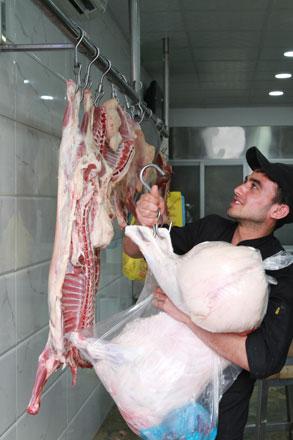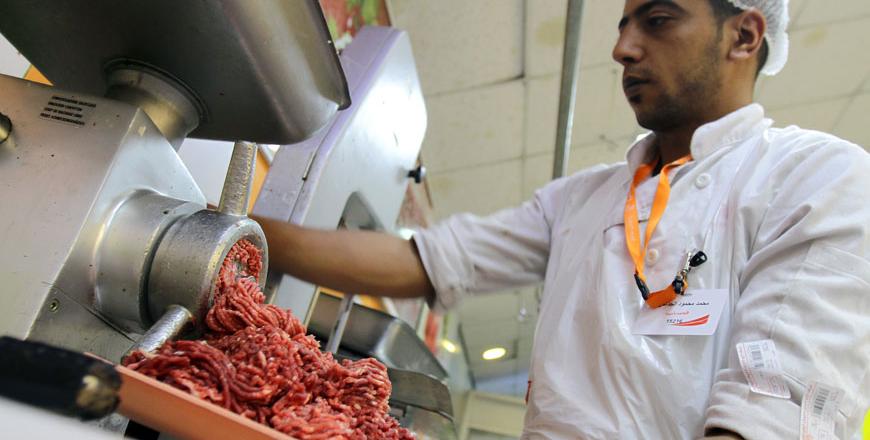You are here
Meat outside Amman ‘much cheaper’ than in the capital
By Omar Obeidat - Jun 10,2016 - Last updated at Jun 10,2016

A butcher prepares meat in Amman recently (Photo by Hassan Tamimi)
AMMAN — Residents of Amman are leaving the capital to buy their fresh red meat, as the capital's butchers charge up to 50 per cent more than meat shops outside the city.
A kilogramme of mutton in most Amman butcher shops sells for JD12, while in other governorates it is sold for JD8 to JD9.
Musa Elayan, a butcher in Hibras village in the governorate of Irbid, recently told The Jordan Times that prices of fresh local red meat are down because the prices of local livestock have been declining for nearly two months.
Beef is sold in his shop for JD6.5, while mutton costs JD8.5.
At another shop in the same town, which is some 90km north of Amman, beef was also being sold for JD6.5 per kilo and mutton was priced at JD8 a kilo.
Amman resident Omar Maharmeh told The Jordan Times that he goes back to his hometown of Sahab to buy meat for his household.
"It is much cheaper there. I pay for five kilos what I pay here [Amman] for three kilos," he said. Sahab is some 30km southeast of the capital city.
Mohammad Mefleh, a farmer and breeder from Irbid, said prices of live sheep in the domestic market have gone down in the past few months due to what he termed as "dumping" the market with live sheep imported from Romania.
"The sheep you used to buy for JD300 is less than JD200 now," he said, adding that he expects prices of local sheep to remain low until at least the end of the year.
In Karak, a kilo of fresh locally produced mutton is around JD8.5, according to Mohammad Mubaidinm, a resident of the southern governorate.
The daily indicative report for prices of essential commodities issued by the Ministry of Industry, Trade and Supply said the fair price of local mutton should be JD11.40 a kilo, while beef should cost around JD7 per kilo.
Nimer Haddadin, spokesperson of the Ministry of Agriculture, said that local live sheep cover around 35 per cent of the domestic market needs, and that the remaining need is met by imported livestock.
He told The Jordan Times that importing large quantities of sheep, particularly from Romania, seeks to create stability in the market in terms of prices and quantities of fresh meat, adding that the Kingdom imports between 400,000 and 500,000 live sheep from various countries, including Romania, Georgia and Australia.
"Local fresh meat is the preferred meat for Jordanians, followed by Romanian meat," Haddadin said.
On the gap in prices between Amman and other places in the Kingdom, he said the reasonable price of local fresh mutton should be JD9 or JD10 per kilo.
He acknowledged that prices in Amman reach JD12 a kilo.
"I buy it here for JD12. But Amman is the capital and prices are always much higher than any other area in the Kingdom," Haddadin said.
Related Articles
AMMAN — There is a “surplus” of meat available during the holy month of Ramadan, with around 450,000 local and 220,000 imported head of shee
AMMAN — Imports of sheep meat from Georgia in the upcoming period are expected to lead to an additional drop in local meat prices.Promises f
AMMAN — The Industry, Trade and Supply Ministry confirmed on Wednesday that local and imported meat is available in the local market in quan












